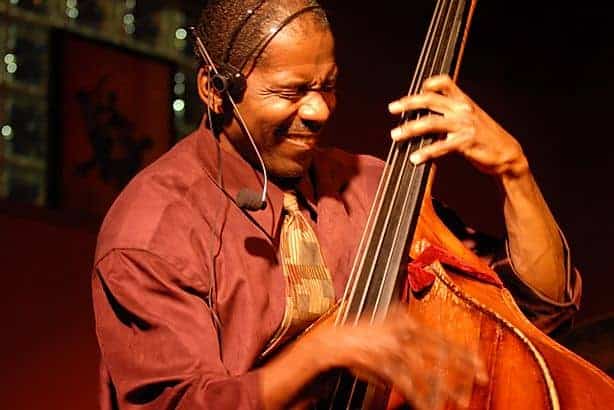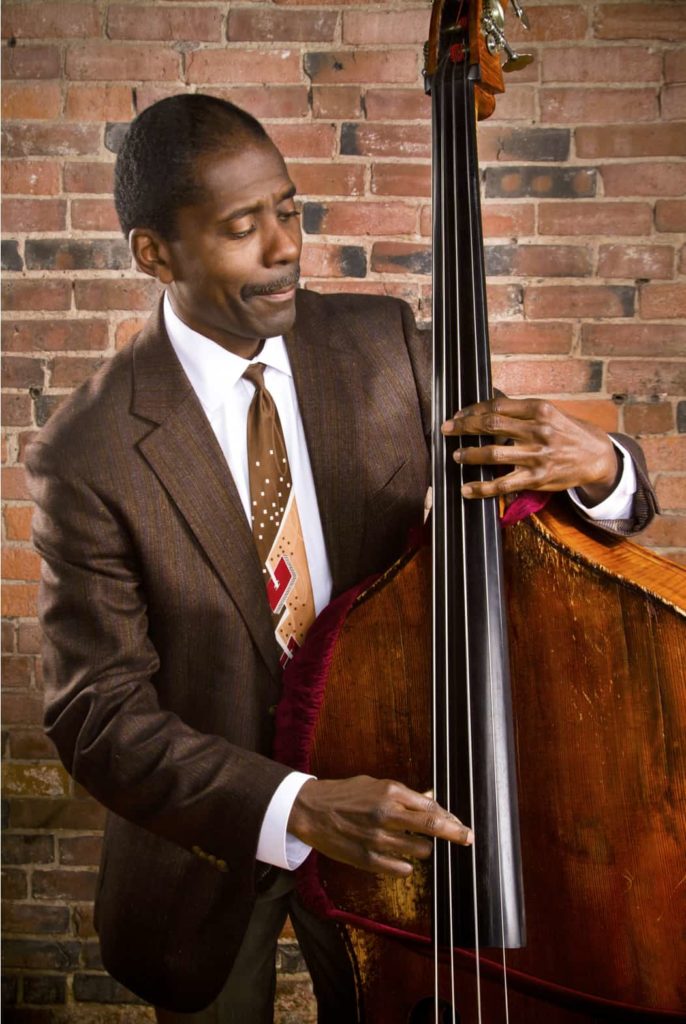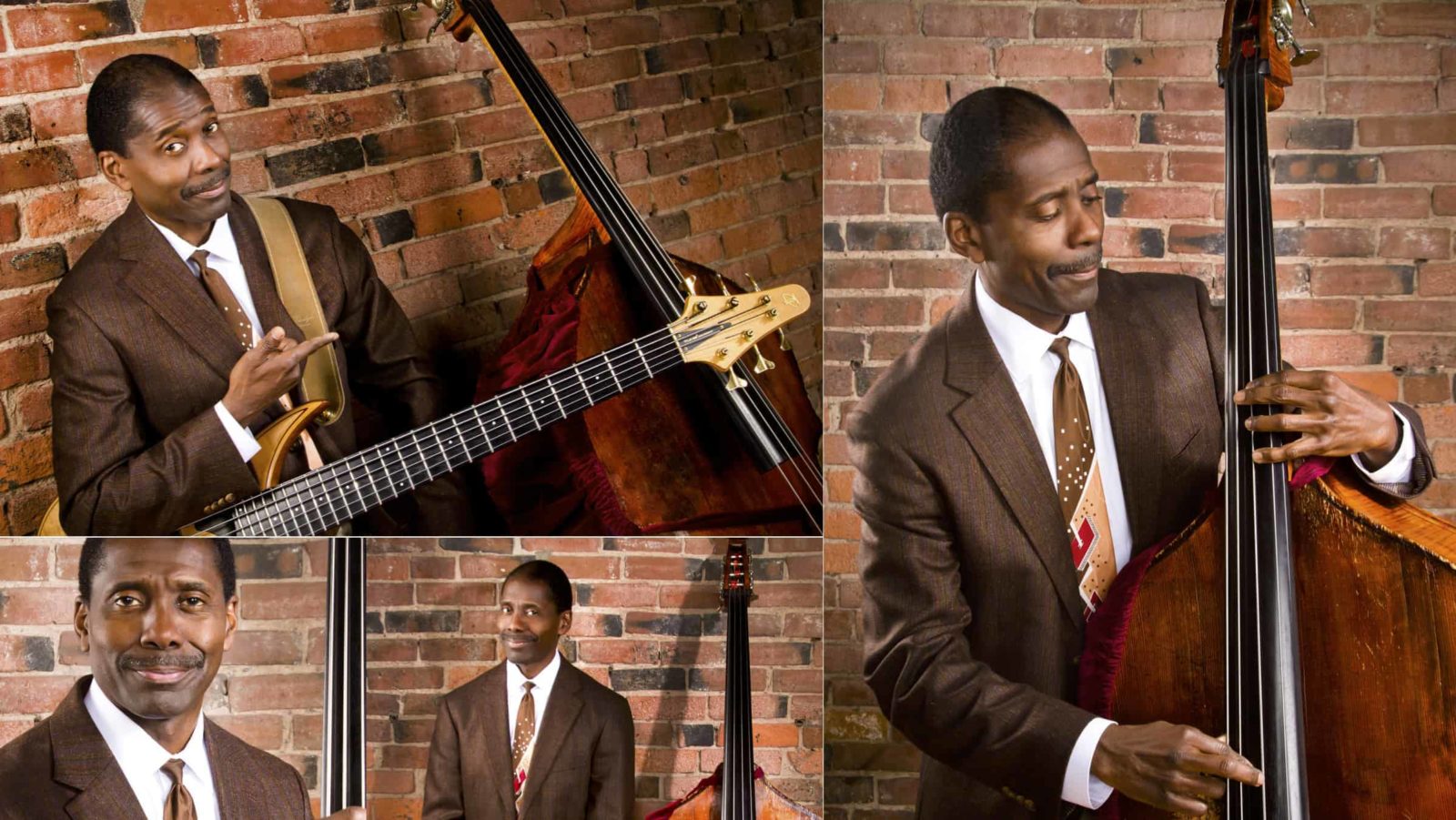“Can you imagine 400 years of your history, 400 years of you – where you come from?” composer Avery Sharpe’s niece, Sofia Rivera, speaks her own words aloud in Sharpe’s newest album 400: An African American Musical Portrait. “I can only go back to 1619 in America. As a Black American, my history begins on the slave ship, crammed, packed, suffocating, drowned at sea or worked till I die, only for the next generations to still be chattel until … until the Civil War.”
“400 is about the entire African American people,” Sharpe says, and it has become the culmination of his life’s work. His work has a wide and powerful range. As a composer and musician on standing bass, he has performed worldwide with jazz greats from Archie Shepp and Art Blakey to Dizzy Gillespie and Wynton Marsales, and performed for more than 20 years with McCoy Tyner, best known as the jazz pianist with John Coltrane’s Quartet. And he has led the Williams College small jazz combos as director for more than 10 years.
Sharpe has a lifelong fascination with African American history, and his newest album, 400, illustrates that deep history through music.
“It’s been a lifelong research,” he said “because I’m a historian as well. I’ve taught gospel music [and] I’ve taught history of jazz, so my research is always ongoing.”
400 gives an epic musical representation of African American history, and as the country finds itself in the midst of nationwide protests against police brutality and anti-Black racism, this project speaks to the past, the present and the future.
“It’s extremely timely,” Sharpe said.

Avery Sharpe performs on standing bass.
Sharpe’s music and composition
On 400, many of the musicians performing with him are also his family. Along with his niece, his nephew and many of his brothers and sisters sing on the album. Sharpe comes from a long line of musicians, and his family often perform with him, he said — and inspire his music.
“My mother was a piano player,” he said. “She was my biggest musical influence.” His mother was a piano player and choir director at the Church of God in Christ, so she gave each of her eight children piano lessons, and they particularly stuck with Sharpe.
He started playing the accordion in junior high school, and then electric bass in high school. At the University of Massachusetts, Amherst, he discovered the acoustic bass, which he is now most known for, as he has played bass in numerous performances and recordings with top musicians and ensembles. He also started composing music while in college, starting with rhythm and blues and soul and progressing later into jazz.
He has written many jazz and larger orchestral and choral works, often mixing jazz with a larger orchestral instrumentation, and many draw on history and historical figures. He often combines many of the genres he grew up listening to and playing, and represents larger themes, drawing on family or African American history, so that his music reaches far beyond the notes on the page.
“Everything starts from the bottom, which is the bass,” he said, “but … my personal composing is done on the piano.”
He makes extensive use of string instruments and often incorporates jazz violin, sometimes a solo violinist, as in “Harlem was Jazz” from the score of the stage production Raisin’ Cane, and other times creating a larger-than-life sound out of many string instruments playing together, as in “Fiddler” from 400.
Sharpe said he became interested in composing for big ensembles after college. “I just thought that I needed a bigger palate, so then I started trying to write for choirs, which I came up [singing in],” he said. “So I started writing more for larger ensembles, big bands [and] orchestras.”
He has worked on large projects, combining a full orchestra with a gospel choir, a symphony choir and a jazz quintet.
The Influence of Family
One theme underlies many of Sharpe’s compositions — his family. He wrote a series called Extended Family, which was released in three parts starting in 1994: Extended Family, Extended Family II: Thoughts of my Ancestors and Extended Family III: Family Values. The first album in the series honors his father, who passed away in 1988.
“My father was part of the great generation from the Depression and World War Two,” Sharpe said, “and he was most proud of his kids. I just write from what I know, and I know about family and the effect that it had on me and my outlook on life.”
Sharpe is the sixth oldest of eight children, and many of his siblings have a passion and talent for music. He often involves them in his music. “Whenever I do larger projects I can involve my family,” he said, “like my brother Kevin. He can put the choirs together because he deals more with gospel music.”
For 400, Sharpe’s brothers and sisters sing in the choir, and he asked his niece, Sofia Rivera, to put together the spoken word piece she reads aloud in the ninth and penultimate song on the album, Sharpe’s arrangement of the old spiritual “Ain’t Gonna Let Nobody Turn Me Around.”
“I [told] her, I want to do something a little different with this song,” Sharpe said, “and I gave her the theme and what I wanted for the spoken word and she came up with that and the rhythm of it.”
Sharpe’s arrangement of the spiritual begins with the melody played on bass. The choir comes in, repeating the melody and adding lyrics with a clear sense of power: “Ain’t gonna let nobody turn me around… I’m gonna keep on walkin’, keep on talkin’, marchin’ into freedom land.”
The lyrics continue in traditional spiritual forms, repeating with subtle changes. And then the music begins to sound like a jazz standard when the piano solos, escalating in tension and giving way to a bass solo. The chorus re-enters with vocalists singing “Ain’t gonna let segregation turn me around!” And then the feel of the tune changes again as it makes way for Rivera’s spoken word.
Sharpe said he enjoys highlighting his friends and family in his music.
“The great thing about being an artist is that some people who are great musicians also happen to be your friends,” he said.

Nationally recognized standing bass musician and composer Avery Sharpe has released a new album honoring 400 years of Black American history. Press images courtesy of the artist.
African American Heroes and Sheroes
In 400, Sharpe traces the 400-year history of Black Americans, beginning in 1619, when a trade ship brought the first enslaved people on record from Africa to North America — not to Jamestown, as is widely believed, but to Hampton, Virginia, he explained.
The album began with a conversation, he said. In 2018, he ran into a friend who mentioned that 2019 was coming up.
“When she mentioned that, I started having all these ideas and hearing all this music,” he said. “I love themes. To think about how [to] acknowledge that monumental thing that’s going to happen – that Africans have been here for 400 years – I couldn’t get the idea out of my head.”
Sharpe is passionate about the history of his ancestors, a theme he explores in many of his musical works.
“My heritage is African American,” he said, “so I write about heroes and sheroes in African American history.”
History and music are closely linked for him.
“My professors [were] great musicians, like Max Roach and Archie Shepp,” he said. “They were also historians, and I got into [history] because I felt that the more you get into the history of the music and understand where it comes from, [the more] it helps you with the interpretation and being more sensitive to what was happening with people.”
He has written the score for a one-woman play based on New York in the 1920s called Raisin’ Cane: A Harlem Renaissance Odyssey, telling the stories of historical figures from W.E.B. Du Bois to Zora Neale Hurston. Jasmine Guy performed — she starred in the Cosby Show spin off A Different World in the late 1980s — and Sharpe’s three-musician group, the Avery Sharpe Trio, played his original score.
400: An African American Musical Portrait
In his newest album, Sharpe condenses 400 years into one hour of music. He started in 1619, in the first song on the album, “Arrival,” thinking about the arrival of the ship and the enslaved people taken from their homes and forced here.
“I was thinking [of] this epic kind of thing,” he explained. “It’s … a marking of … going into something different and big that produced this whole country.”
To encompass the epic feeling he wanted to foster, “Arrival” features Don Braden’s strong saxophone melody with Tendai Muparutsa’s African-inspired djembe rhythms and a chilled, hopeful guitar solo played by Kevin Eubanks with the voices of a choir singing in Swahili, representing a new people coming to the U.S.
Sharpe gathered world class jazz musicians together to perform this work; Don Braden is a multi-instrumentalist, award-winning composer and director of the Harvard University Jazz Combo Initiative; Tendai Muparutsa is an internationally recognized performer, music educator, ethnomusicologist and bandleader; and Kevin Eubanks is a well-known guitarist and former music director of the Tonight Show band.
The journey on the slave ship was incredibly painful for the people whom 400 was written about, as Rivera shed light on in her spoken word piece, and the next tune in the album focuses on the Africans’ question — can they ever return to the places and people they have lost?
“I was thinking about okay, after you’re here, what’s the first thing on your mind,” Sharpe said, “and it’s ‘how do I get back home?’”
This thought inspired the second tune, “Is There A Way Home,” with the choir singing in a Liberian dialect and in English, and Braden on solo flute.
The album continues through the colonial period, the antebellum period, the Civil War, emancipation, Reconstruction, the Harlem Renaissance and today, progressing through music genres from spirituals to blues, jazz and ragtime and ending with “500,” which is Sharpe’s optimistic look into the next hundred years in the U.S.
In February, Sharpe directed a performance of 400 at Williams College, where he has directed the small jazz combos as a part of the Williams jazz program for a decade. Williams faculty including jazz singer Samirah Evans, jazz saxophonist Kris Allen and percussionist Tendai Muparutsa performed in the concert along with seven Williams students.
He also created a visual aspect to the performance, projecting historical images on a screen above the stage throughout the performance as the music traced U.S. history. “I love multimedia things,” he said. “I love putting a lot of different art together.”
400 and Black Lives Matter
In the current political climate, while protests across the nation are standing against police brutality and racism, Sharpe said he believes 400 to be extremely timely. He pointed to the 1960s and 1970s, when musicians started to sing about change and protest song became an increasingly popular genre of music.
“Artists were trying to get people to think,” he said, “and I think with the Black Lives Matter movement, artists are going to be doing more meaningful [work].”
Sharpe stressed the importance of using art to shed light on these issues.
“I hope that artists will be trying to make people more aware,” he said. “Hopefully people will keep the pressure on and hopefully artists will be inspired to inspire people and to keep people thinking.”
He emphasized the importance of spreading awareness about anti-Black racism and police brutality, as he spoke about some of the hardships that Black people have to deal with every day in this country.
“Suddenly, white America has discovered that Black folks have been getting shot,” he said. “We’ve been saying … for years that we’ve been mistreated by the police. I don’t know a Black person, a Black male anyway, who’s come out of a Black neighborhood who hasn’t had a bad encounter with the police.”
The last song on the album 400, entitled “500,” represents an optimistic glimpse into the next hundred years of our nation. Sharpe said he likes to be optimistic. “I hope that people will keep the pressure on and really cause some things to change,” he said. “That’s what I’m hoping for and that’s the purpose of my final tune.”
He also said that the younger generations have a call to order to turn our nation around and make the next hundred years better than the past 400. “I’m sure your generation is going to rise to the occasion like every other generation and get through it,” he said.
What’s Next for Avery Sharpe
After teaching at Williams College for the past decade, Sharpe has retired from teaching and is planning to focus more on future big projects similar to 400. Now he is figuring out how to perform virtually from his home.
“Music is a live thing,” he said. “You’ve got the audience, you’ve got the energy of the audience and the energy of the band. So we just have to figure out how we’re going to do this.”
He is testing out different online programs for virtual concerts in which he will play piano, upright bass and six-string electric bass. He also plans on hosting virtual masterclasses through Zoom.
He is working now with saxophonist Chico Freeman and drummer Ronnie Burrage, with whom Sharpe worked alongside McCoy Tyner. Freeman is a jazz saxophonist and trumpeter who won the New York Jazz award in 1979 and has performed, composed and produced music for decades. Burrage is a percussionist, keyboardist, composer and bandleader who has performed at world-famous venues across the globe.
In terms of his projects, he plans on extending the work he did with 400 into a larger orchestral piece with a bigger choir.
For his next new project, he is studying ancient East African history – possibly visiting the region when travel is safer – and hoping to create a project similar to 400 based on his research. He believes many historians give credit for ancient civilizations in East Africa to the Middle East, but what is widely believed about the area may not be historically accurate.
“I’m starting to go back to Egypt and even Sudan and Ethiopia,” he said, “where they had civilization 25 centuries ago and further. People always talk about Egypt, but they don’t realize some of the oldest brick buildings are thousands of years old in Sudan and Ethiopia.”
He is inspired by the jazz musician Sun Ra, who studied ancient Egypt, but Sharpe wants to look even further into the past.
“I’m still thinking about how the music is going to sound,” he said. “[I’m] still trying to think in terms of larger projects, whether I’m trying to get some … way to get over there and actually hear these things and possibly perform.”
Even in the pandemic, Sharpe is adamant about continuing to create music and perform.
“Artists are going to continue to create no matter what is happening,” he said. “That’s what we do.”
You can read more about Avery Sharpe and his music on his website.

